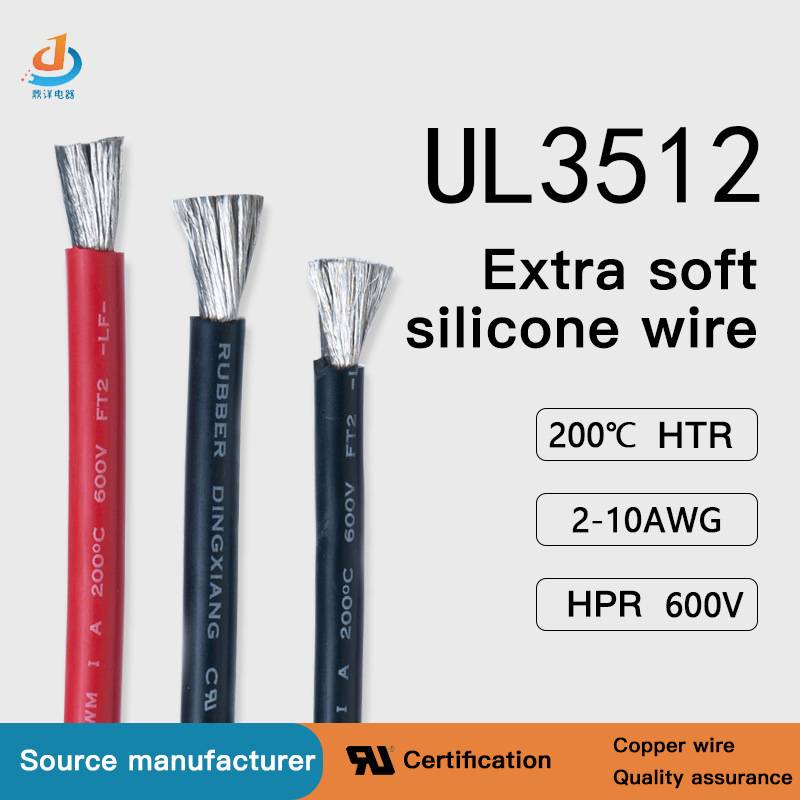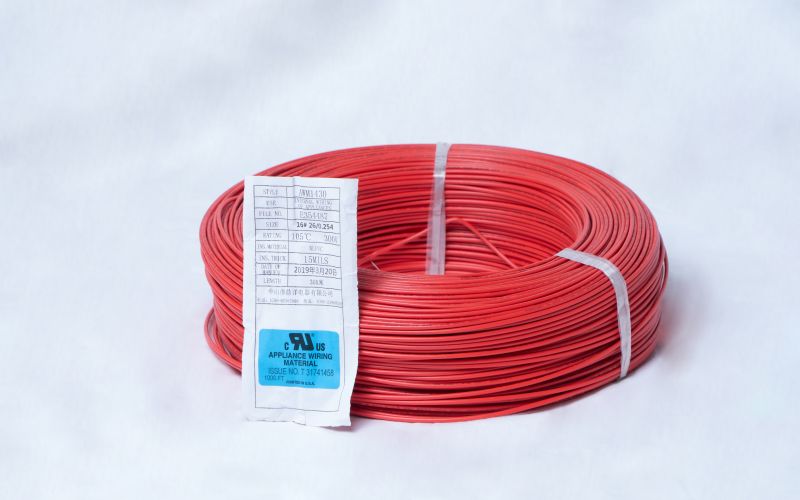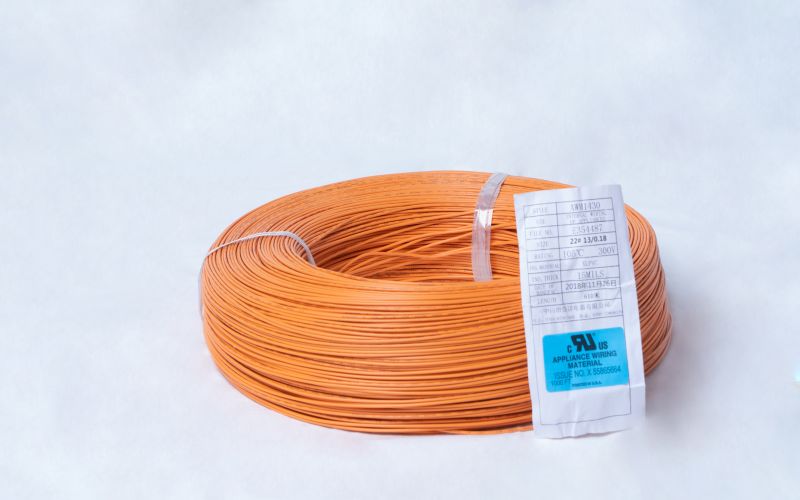When selecting electrical wire for your projects, the material you choose plays a significant role in determining the performance, longevity, and safety of the wiring system. Among the most commonly used types of wire are UL-certified silicone wire UL3512 and PVC wire. Both types are used in a wide variety of industries, but they each have distinct characteristics that make them suitable for different applications. Understanding the differences between these two types of wire can help you make an informed decision based on your specific needs. In this article, we’ll take a closer look at how UL3512 silicone wire compares to PVC wire in terms of temperature resistance, flexibility, durability, electrical performance, applications, and cost.

Temperature Resistance: A Key Factor for High-Performance Applications
One of the most important differences between UL-certified silicone wire UL3512 and PVC wire is their temperature resistance. Silicone wire, especially the UL3512 variant, is known for its excellent heat tolerance. It can operate in temperature ranges from -60°C to 200°C, making it ideal for high-temperature applications like automotive engines, industrial machinery, aerospace components, and LED lighting systems. This remarkable heat resistance means that UL3512 silicone wire can withstand extreme conditions without degrading or losing its effectiveness. In comparison, PVC wire is not as heat-resistant as silicone wire. Typically, PVC wire can handle temperatures between 70°C and 105°C. While this range is sufficient for many standard applications, it limits PVC wire’s use in environments where temperatures can exceed these thresholds. In applications that involve significant heat exposure, PVC wire may degrade over time, causing insulation to melt or crack, which can lead to electrical failures or safety hazards. Thus, if your project involves high temperatures or environments where heat exposure is a concern, silicone wire UL3512 is the clear winner.
Flexibility and Durability: Why It Matters for Installation and Longevity
Another key difference between silicone wire and PVC wire is flexibility. UL3512 silicone wire is highly flexible, even at extreme temperatures, making it easier to install in tight or complex spaces. Its flexibility is particularly valuable in applications where wires need to be bent, twisted, or routed through narrow spaces, such as in robotics, aerospace systems, or high-performance electronics. Additionally, silicone wire UL3512 retains its flexibility over time, even under harsh environmental conditions, ensuring that it can endure mechanical stress without breaking or cracking.
PVC wire, while it offers some degree of flexibility, is generally more rigid than silicone wire. This rigidity can be a disadvantage when working in environments where flexibility is necessary for proper installation. Over time, PVC wire can also become brittle, particularly when exposed to UV light, moisture, or extreme temperatures. This brittleness can lead to cracks or other forms of damage, resulting in potential safety risks or the need for frequent replacements.
In terms of durability, UL3512 silicone wire outperforms PVC wire. Silicone is resistant to environmental factors like UV radiation, ozone, and moisture, which can cause PVC insulation to degrade over time. Therefore, silicone wire UL3512 is a more reliable choice for long-term use, especially in challenging environments.

Electrical Performance: Safety and Reliability
When it comes to electrical performance, UL3512 silicone wire has a clear advantage over PVC wire. Silicone wire provides excellent electrical insulation, offering high dielectric strength and low insulation resistance. This means that silicone wire UL3512 helps prevent electrical arcing and short circuits, ensuring safe and reliable operation in high-voltage applications. It also maintains its electrical properties even under extreme temperatures, which is a crucial factor in preventing failures in critical systems.
PVC wire, while functional for basic electrical tasks, does not offer the same level of electrical performance under high-stress conditions. Its insulation can degrade more quickly, especially in environments with fluctuating temperatures or exposure to chemicals. As a result, PVC wire may not be suitable for applications that require a high degree of safety, reliability, or electrical integrity.
For industries that require strict safety standards, such as automotive, aerospace, and medical device manufacturing, UL-certified silicone wire UL3512 is often the preferred choice due to its superior electrical performance and reliability.
Applications Across Different Industries
The choice between silicone wire UL3512 and PVC wire often comes down to the specific requirements of your industry and application. Silicone wire UL3512 is widely used in industries that demand high performance, safety, and reliability. These include the automotive industry (for wiring in engines and other heat-sensitive components), the aerospace industry (for wiring in aircraft and spacecraft), medical devices (where high temperature and flexibility are critical), and in various industrial applications like robotics and automation. On the other hand, PVC wire is commonly used for general-purpose applications where high heat resistance or flexibility is not as critical. It is widely used in household wiring, electrical appliances, and low-voltage applications where the risk of heat buildup is minimal. While PVC wire is suitable for everyday tasks, it is not the best choice for environments that require durable, long-lasting, and heat-resistant materials. For manufacturers and engineers looking for high-quality silicone wire UL3512, sourcing from a trusted silicone wire UL3512 supplier ensures access to certified and reliable products that meet international standards like UL and RoHS.
Cost Comparison: Affordability vs. Performance
Cost is an important consideration when selecting electrical wire. PVC wire is generally more affordable than UL3512 silicone wire, which can make it an attractive choice for projects with limited budgets. However, the lower upfront cost of PVC wire may be offset by the need for more frequent replacements or maintenance in harsh environments.UL3512 silicone wire, while more expensive initially, offers better long-term value due to its durability, heat resistance, and superior performance. For applications where safety, longevity, and reliability are paramount, investing in silicone wire UL3512 can save costs in the long run by reducing the risk of electrical failures, fire hazards, and the need for replacements.

Environmental Considerations: Choosing Eco-Friendly Options
An often-overlooked factor in selecting wiring materials is their environmental impact. Silicone wire UL3512 is more resistant to environmental factors such as UV radiation, moisture, and chemicals, making it a more eco-friendly option for outdoor and harsh applications. Additionally, silicone wire is often more durable, which means it needs to be replaced less frequently, contributing to less waste over time.PVC wire, while functional, may degrade more quickly when exposed to UV light or harsh chemicals. It can also release harmful substances when burned, which is a concern from an environmental perspective.
Conclusion:
In conclusion, both UL-certified silicone wire UL3512 and PVC wire have their places in the world of electrical wiring, but they cater to different needs and applications. Silicone wire UL3512 excels in high-temperature environments, offering superior flexibility, durability, electrical performance, and safety. It is the ideal choice for demanding industries like automotive, aerospace, and electronics, where long-term reliability is crucial.On the other hand, PVC wire is a more affordable option for general-purpose wiring in low-risk environments. It may be suitable for less demanding applications where heat resistance and durability are not top priorities.When selecting between these two types of wire, consider the specific requirements of your project, including temperature range, flexibility, durability, and electrical performance. If your project demands high-performance wiring, it’s worth investing in silicone wire UL3512 from a trusted silicone wire UL3512 supplier. This will ensure the best safety, reliability, and longevity for your application.


